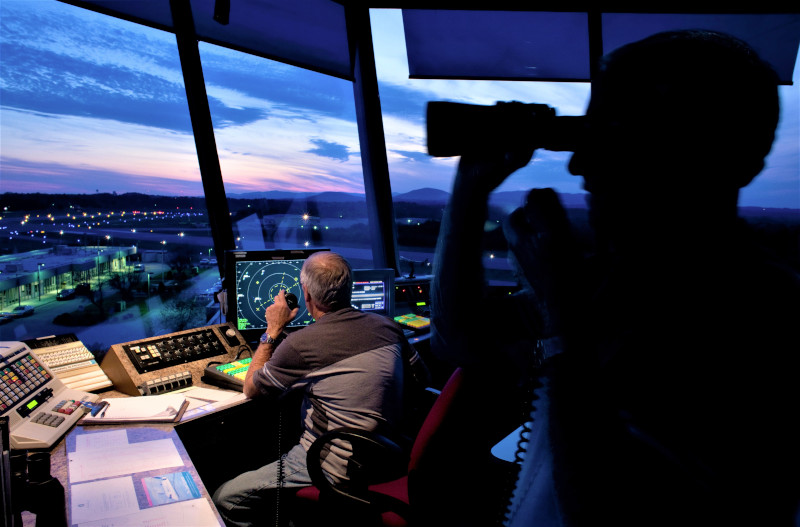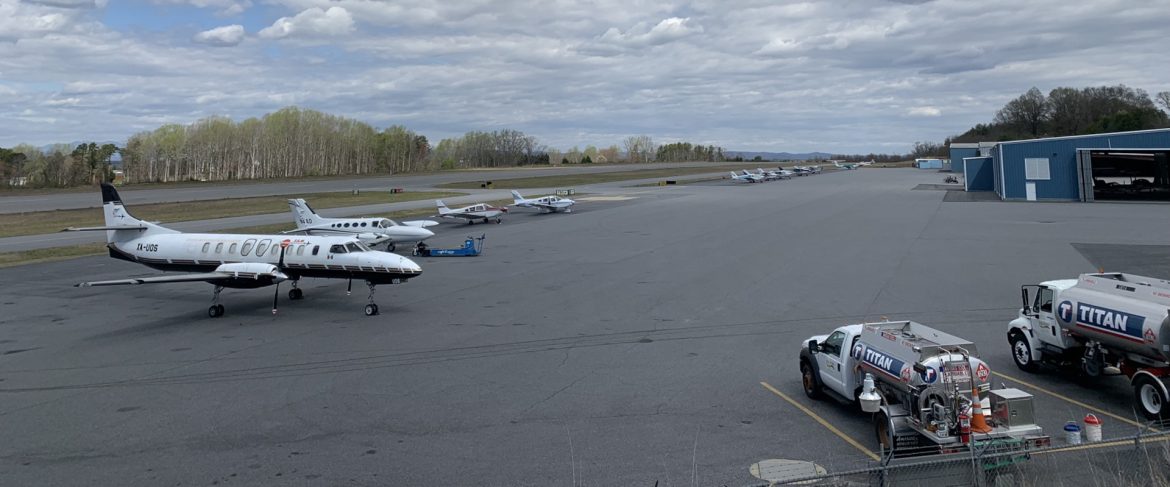Hickory Regional Airport
The Sky’s the Limit in western North Carolina
Charting an aviation path with the headwinds behind them
The Hickory Regional Airport is a general aviation airport nestled in the foothills of the Blue Ridge Mountains in west/central North Carolina, about three miles west of the City of Hickory. It first opened in 1940 with two unpaved runways, began its first scheduled air carrier service in 1941, and served as a pilot training center for the military during World War II. Over the years it has hosted several commercial airlines, including Capital Airlines, Piedmont Airlines, CCAir, and Delta, the last of which ceased operations at Hickory in 2005.
Owned and operated by the City of Hickory, the 739-acre airport has one asphalt runway, which measures 6,400 X 150 feet; a full-service FBO (Fixed Base Operator), that operates year-round, and is also owned and operated by the city; two fuel farms and three fuel trucks providing Avgas and Jet A fuel; two flight schools; ARFF (Aircraft rescue and firefighting) services; a US Forest Service base for the western part of the state; and a customer terminal that was built in 1960. Today, it caters to a combination of private propeller aircraft, corporate jets, charter companies, medevac flights, and cargo planes.
New Management Direction

Chad Hunsucker, Airport Manager
Chad Hunsucker is the airport’s new Manager, having been appointed this past January to replace Terry Clark who retired after more than 42 years of service. After growing up in Hickory, Hunsucker spent 27 years in the US Navy, managing aviation operations and personnel at numerous military airfields. He also served as an Air Traffic Control Specialist at nearby Concord Regional Airport. About his new position, he relates, “Hickory is my hometown. The opportunity to come back here, and to provide the vision of where we want to go with this airport is amazing to me. I couldn’t have dreamed of a better opportunity.”
Construction of a leading path
Hunsucker outlines some of the airport’s recent, current, and future projects. “One of the largest projects we just had involved a closing, which will turn into an opening,” he begins. “We used to have two runways here; the secondary runway was officially closed in January. The reason we did that was to turn that real estate into an area we could refocus on for economic impact. We recently completed building a set of 12 T-hangars. We have already started construction on a second set of 12 T-hangars, and we are also pursuing building another group hangar that can hold larger jet aircraft. That project is in its final stages so we’re expecting construction on both the new T-hangar and the group hangar to begin this summer. That allows us not only to attract new general aviation customers who want to leave their aircraft here at the airport but also more corporate customers who want to base their aircraft here. One of the challenges many airports throughout the country have right now is the lack of space for aircraft. We are one of the few ones that are pursuing building new hangars to increase our based customer list. We’re expected to increase our base customers by about 30 to 40 aircraft next year. So, we’re excited about that.”
Concurrent with the new hangar space is the recent awarding of an FAA-145 certification to one of the airport’s service providers, Appalachian Aero Group, which will allow it to provide repair services. “Having that FAA-certified maintenance facility available is a big attractor for people wanting to decide to put their airplane in an airport,” Hunsucker adds.
Capital improvements take off
At the end of the airport’s remaining runway, Hunsucker reports that it has plans to install an EMAS (Engineered Material Arresting System), which uses crushable material to help stop an aircraft that overruns it. “Another thing we’re looking into is extending our runway,” he notes. “It’s currently 6,400 feet long and we want to go out to 7,000 feet, which will allow us to accommodate larger aircraft, and for the aircraft here to be able to carry more fuel as they depart out of Hickory, which will extend their trip. We’re also doing some other capital improvement projects like reconfiguring some of the taxiways to simplify the system here, and possibly pursuing some paving projects in the future to keep our surfaces to the highest standard we can.”
While Hickory Regional no longer hosts a commercial airline, it’s able to accommodate aircraft as large as Airbuses and 737s, and it has retained its FAA-139 certificate, which certifies that it meets all the standards to provide such services. “What’s holding us back at this time is that our terminal is not compliant with Homeland Security and TSA,” Hunsucker explains. “You have to remember; back when we last had commercial service, those agencies didn’t exist. So, we’re trying to renovate our existing terminal to try and attract a commercial carrier. And that would include better security and building to TSA compliance — they have certain rules for how you can screen baggage and passengers. You also have to have a holding room after your passengers have cleared security and before boarding. And on top of that, the 1970s was probably the last time the building had an upgrade. So, it needs a little facelift.”

Pilot training and aviation education on the horizon
Another challenge faced by the aviation industry, country-wide, is a shortage of trained pilots. “I don’t think the pilot shortage has slowed any,” Hunsucker remarks. “And there’s a backlog to get folks qualified and off to the airlines. We currently have two flight schools here (Saltair Aircraft and Sky View Aviation), and I would love to be able to bring in a larger flight school in the future. There’s a need for it and we would love to help the commercial world meet that need by bringing in an interested flight school to Hickory.”
In addition to pilot training, the airport also has an internship program for high school students interested in other aspects of the aviation industry. “Our first intern just started,” says Hunsucker. “He’s a local high school senior who will graduate soon. Another intern will start in the fall. Both of these young men expressed their desire to pursue an aviation career. And the airport can provide those interns with hands-on, on-the-job training; there’s the administrative staff, the operations and maintenance staff, you have the line personnel staff, and then we have the FBO side. Also, some of my employees here already are student pilots. So they can also talk to the interns about maybe becoming a professional aviator. So, we’re excited about that program. And I think we won’t have a problem getting interested high school students to continue to come here and do an internship.”
Future growth ahead
Hunsucker sees the Hickory area as filled with potential and the airport as a partner in its growth. “The metro area is growing substantially with new industry coming and new corporations,” he states. “Last month, I took a picture of our FBO ramp and there was no room to park any more airplanes because there were that many corporate jets there. On that day, it proved how much people want to do business in this area and they utilize our airport to do that. We’re also the gateway to the western mountains. We get a lot of people who fly into the airport during ski season and also for the summer. They’ve got homes up in the mountains and will fly into Hickory with their aircraft. From that side of it, we’re fortunate.”
Finally, Hunsucker reports that two other projects will help elevate the airport’s presence in the community. The first is the creation of the new Aviation Walk, an added segment to the city’s Hickory Trail, a series of connected multi-use paths and walking trails in and around the area. In addition, the City of Hickory is partnering with the Hickory Aviation Museum and Catawba Valley Community College to construct a new building at Hickory Regional Airport to house the museum’s vintage military aircraft, preserve aviation history, and provide STEM education and workforce development opportunities to the Hickory region. “I think the Aviation Museum is going to be huge to this area,” he declares. “It is going to be a top-notch facility and I think people are going to come from hours away to see it; and being right by the airport, that’s going to be better for us. We anticipate people wanting to fly here in their aircraft just to go to the museum, and we are super excited about bringing tourists here.”
AT A GLANCE
Hickory Regional Airport
WHAT: A general aviation airport
WHERE: Three miles west of Hickory in Burke County, North Carolina
WEBSITE: www.hickorync.gov/airport
PREFERRED VENDORS
Lenoir Rhyne University – www.lr.edu
Lenoir-Rhyne’s impact extends far beyond the classroom, acting as a vital asset that strengthens Hickory’s economy, culture, and overall well-being. The university functions as an economic engine, employing hundreds of local residents and attracting students who spend money at businesses throughout the region. Thousands of alumni, families and friends visit campus each year for events, further contributing to a vibrant downtown and a healthy tax base for the city.
Lenoir-Rhyne serves as a cultural and entertainment hub for the Greater Hickory region. From thought-provoking lectures and captivating art exhibits to a spirited Division II athletics program, the university’s events enrich the lives of residents.
Lenoir-Rhyne graduates are well-equipped to meet the demands of the modern workplace. This skilled workforce is a boon to local businesses, who can recruit top talent right in their backyard. Local businesses also can tap into educational opportunities for their existing employees.
Many graduates choose to stay in the Hickory area after graduation. They build families, launch successful careers, and contribute their talents to the city’s continued success. This deepens the connection between Lenoir-Rhyne and Hickory. In essence, Lenoir-Rhyne is more than just an institution of learning; it’s an integral part of the fabric of Hickory.
Flex Crew Aviation – www.flyflexcrew.com
Headquartered at the Hickory Regional Airport in Hickory, North Carolina, Flex Crew Aviation specializes in offering Carolina based business owners a hands-off approach to aircraft management. Our capabilities allow us to implement a custom tailored flight department specific to their operational needs while cultivating long term relationships.
Appalachian Aero Group – www.appaerogroup.com
Appalachian Aero Group provides personalized aircraft maintenance solutions. Our team offers aircraft owners a full picture of their maintenance events, allowing them to make the best decisions regarding their aircraft care. Our client focused objective is to provide cost and time saving solutions where safety is paramount.





